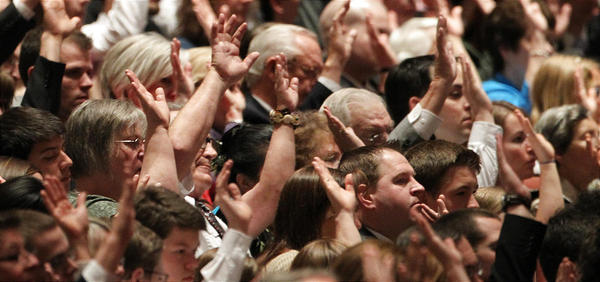Question
Dear Gramps,
I am the branch president of a small branch in our country. Now we as members are taught to support our local leaders. In fact we have been told that if we do not support our local leaders we do not support the prophet.
Now if we take a hypothetical situation that I, as a leader in the branch, would start introducing strange doctrine and make strange demands on the members that weren’t in accordance with prophet’s teachings or if the members felt what I was doing wasn’t inspired, what would members be able to do about it? Should they support me in spite of everything? Should they deny the support and feel unworthy of holding a temple recommend? Should they judge me wrong and go on as they think is right? How can they be sure they’re right, if they’re on slippery ground of not supporting their leader?
Luckily I can support my leaders 100%, because they are all wonderful people, but there are members who feel they cannot support their leaders in all they do. The Church is very young in my country (only 10 years) and I don’t have much experience in such matters, so I would appreciate your answer greatly. Love,
Goran
Answer
Dear Goran,
First, let’s talk about the principle involved, and then about the procedure. Each officer in the church is presented to the congregation for their sustaining vote before taking office. There is deep meaning in the word “sustaining.” Our vote at that time represents a promise or covenant to sustain the leader in the office of his calling. You will never hear the presiding officers call for a sustaining vote of those actions that the individuals think are right or proper. So we are avowed to sustain, support, help, build up the leaders in their callings. They don’t have to come up with the best plan, nor do they have to be inspired in every decision they make. If there are those in the congregation who think that they can do a better job, they would do well to hold their peace until they are called into that position. They would then have the opportunity to demonstrate their abilities.
When a priesthood leader is sustained in his calling, he is accepted in that calling by the Lord, whom he represents to those over whom he presides. The members of the congregation are under the same obligation to follow his direction as they would be if the Lord Himself were giving the instructions. We read-
What I the Lord have spoken, I have spoken, and I excuse not myself; and though the heavens and the earth pass away, my word shall not pass away, but shall all be fulfilled, whether by mine own voice or by the voice of my servants, it is the same. (D&C 1:38)
Now as to procedure- we are all fallible individuals. At times some leader may violate the principles of the gospel and disqualify himself for service. In such cases, and in the extremely rare case that a leader would attempt to get those under his jurisdiction to take some action against the principles of the gospel, it would be proper for those inapropriately put upon to advise that leader’s priesthood leader of the situation. In the case of a branch in the mission field, it would not be out of order to approach the mission president. If the branch were in a developing Stake, then it would be appropriate to advise the stake president of the situation. In each case it would be well to follow the counsel of these priesthood leaders as they would direct.
I am of the impression that if one were to approach a stake or mission president with a complaint concerning a matter of procedure or a course of action that could be improved upon, the direction would be to follow the leader and give him your full support. The stake or mission president could then exercise the option of counseling with the local leader, or leaving the matter in his own hands.
Gramps







